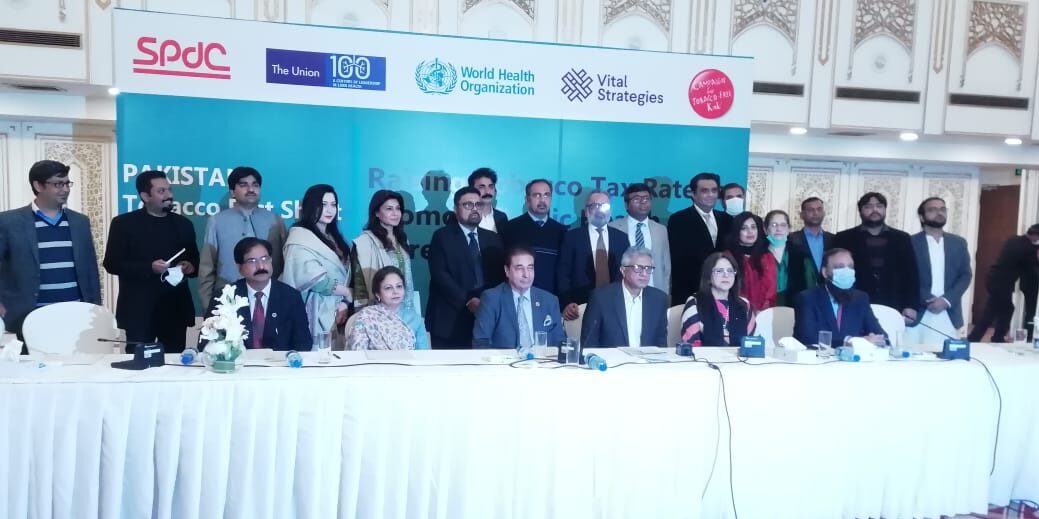Our Correspondent
ISLAMABAD: Higher taxation on tobacco will not only discourage its use but also drive much-needed discussion about its harmful effects on society. This was stated by Dr. Faisal Sultan, Special Assistant to Prime Minister on Health while speaking at a seminar on Raising Tobacco Tax Rates to Promote Public Health and Increase Revenue: Policy Options for Budget 2022-23, organized by the Social Policy and Development Centre (SPDC) in collaboration with World Health Organization – Pakistan, Campaign for Tobacco Free Kids, The Union and Vital Strategies. Dr. Faisal also stressed the need for reforming the health system and educating health regulators and professionals for changing public mindsets regarding harmful effects of tobacco.
Speaking on the occasion, Dr. Aisha Ghaus-Pasha, Member, National Assembly Standing Committee on Finance, Revenue and Economic Affairs said that the fact sheet makes it clear how important it is to reduce tobacco use for controlling non-communicable diseases. Alongside legislation and oversight, it is essential to create deterrence through awareness creation, she said. She proposed that FED be inflation indexed and increase in overall effective tax rate in order to regulate cigarette prices and make it progressively less affordable.
Sharing his views, Mr. Riaz Fatyana, Chairman National Assembly Standing Committee on Law and Justice said that there is a psychological element to smoking and only a collective effort will create awareness about its harmful effects. In addition to increasing tobacco tax, other policy measures such as smoking in public areas be effectively implemented. He said that religious scholars can also play their role in discouraging the youth from cigarette use. This is a menace which needs to be controlled as smoking is directly linked to SDGs on poverty, health, education and economic growth, he said.
Presenting the findings of Tobacco Fact Sheet, Mr. Muhammad Sabir, Principal Economist, SPDC, stated that cigarette prices in Pakistan are the lowest among the region – mainly due to low FED rates on cigarettes. Average excise tax rate is around 45% of the retail price against the widely accepted benchmark of 70%. Cigarettes have become more affordable as FED has not increased since July 2019. This has profound negative implications regarding tax revenue and health outcomes. He explained that tobacco use is associated with more than 160,000 deaths every year in Pakistan. SPDC’s research shows that raising FED on cigarettes by 30% would result in 200,000 fewer smokers and an increase of more than Rs 27 billion in excise tax revenue.
Earlier, introductory remarks were given by Mr. Imran Malik (Country Head CTFK) and Dr. Shahzad Alam (National Professional Officer, WHO Pakistan). Mr. Malik said that tobacco consumption is closely linked with rising poverty in Pakistan. He endorsed the recommendation for increasing tobacco tax in order to make it less affordable and proposed that taxation be based on thorough research rather than data provided by cigarette manufacturers.
Dr. Alam said the focus should be on making cigarettes less affordable as tobacco use is the major risk factor of non-communicable diseases and its damage to the exchequer is also well established. He said that FED is currently 36% and can reach the target of 70% if the proposed tax increase is implemented through coordinated efforts at all levels.
In addition to a 30% increase in FED, it was proposed that the government must continue reforming the tobacco tax system by implementing large excise tax increases in order to make cigarettes progressively more expensive and less affordable, incorporating an automatic inflation adjustment mechanism in the tax policy, and moving to a uniform federal excise duty for all cigarette brands to simplify the tax system.
The vote of thanks was delivered by Dr. Samra Mazhar, Deputy Director, Ministry of National Health Services, Regulations & Coordination, Government of Pakistan.
